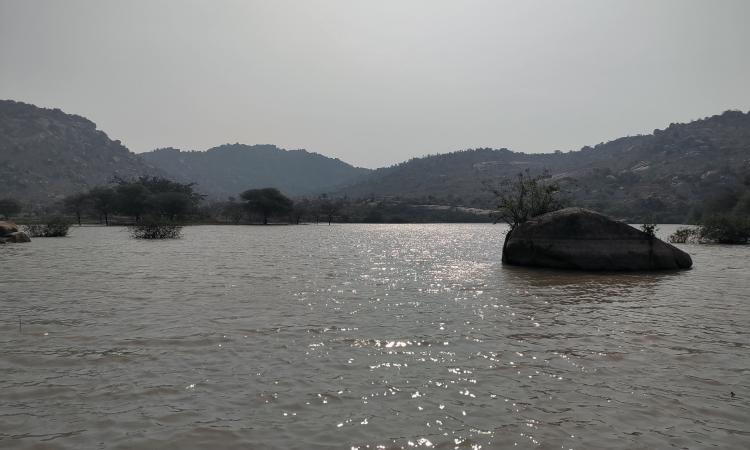
The picturesque village of Marasanapalli in Bagepalli Block, Karnataka is home to 70 households who primarily practise agriculture, livestock rearing, and daily wage labour. Farmers here grow a variety of vegetables such as beans, ridge gourd, cauliflower, spring onion and beetroot, and some with land in the command area of the village tank grow paddy. The tank, known as Devarakere, is located on their large expanse of commons, spanning 270 acres and comprising gomala land and hillocks.
The commons are a sight even during the dry seasons, and the tank is almost always full now, supporting 150 acres of command area and recharging 25+ borewells in the village – which means farmers are comfortably taking two crops in a year. A quick chat with the residents also paints a similar picture; a longer chat reveals that they have worked very hard to be able to realise this life today, and are humbled about how far they’ve come.

The community here has been mobilising MGNREGS funds to take care of their commons for quite some time now. The members attended a series of training programmes about eight years ago that helped them understand the MGNREGS programme, Panchayat procedures and legal provisions for commons, and the need to collectively manage and restore these resources. And so, they formed the Marsanapalli Grama Abhivrudhi Samiti in 2015, which guided the community to undertake works such as a cattle pond, feeder channels, and planting of native species such as pongamia, tamarind, neem and jamun.
These community assets improved water availability and soil moisture regimes, supporting their livelihoods adequately. What they did not account for was that the tank was accumulating silt with every rain. Over time, the silt levels rose, and the area witnessed less than regular rainfall continuously for two years. Consequently, the tank dried up, and so did the borewells. The result was a huge blow to the community’s lifeline that was agriculture. Feeling let down, 20 families were on the verge of migrating to Bangalore in search of alternate livelihood opportunities. Soon enough, the Samiti realised that, to really restore water availability, they would have to desilt the tank.

In 2016, they mobilised the community and decided to desilt the tank through manual labour, which would offer an alternate source of income and alleviate at least a part of the distress they were facing. And so, in 28 days, 35 households got together and removed the silt, earning about 5 lakh rupees in total. The 20 families who wanted to migrate stayed back, with this income acting as the much-needed respite they were in search of. The removed silt did not go to waste – 25 farmers applied the tank silt on 100+ acres of farmland, eventually resulting in reduced expenditure on fertilisers and improved soil health.
Fortunately, the years after witnessed good rainfall, and the tank filled up. Since then, the borewells have also been recharged, no doubt, but the tank has never gone dry at all.
“Earlier, only 10 farmers were able to take a Rabi crop owing to water scarcity. With the tank rejuvenated, the number rose to 60. But we’re not done with putting in hard work. We’ve noticed a leak in the tank wall and wish to repair it soon, and also remove the excessive bushes crowding the tank compound. The tank is our lifeline, we will continue taking care of it,” says Venkateshappa, Samiti member.
Recently, the Samiti has undertaken community fishery in the tank – they were supported with fish seedlings which they are now nurturing. A harvest will follow soon, and they wish to sell it to their own people and nearby villages at a reasonable cost, to support the community’s nutrition.
The village of Marasanapalli shines on as an exemplar of the power of collective action.
/articles/desilting-tanks-and-uplifting-collective-spirits